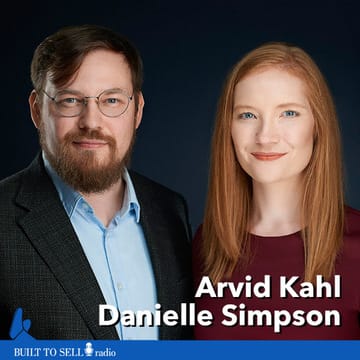About this episode
Arvid Kahl and Danielle Simpson were living together in Berlin when Kahl noticed his partner struggling to complete feedback reports about the students to whom she was teaching English as a second language.
To read a transcript of this episode, click here.
Arvid Kahl and Danielle Simpson were living together in Berlin when Kahl noticed his partner struggling to complete feedback reports about the students to whom she was teaching English as a second language.
Most of Simpson’s report cards were similar, yet she had to waste hours re-typing identical messages about dozens of students every night. Kahl, a software engineer, saw a process ripe for automation and built a little tool that allows a teacher to select from a list of pre-scripted student feedback options and accelerate the process of providing comments about students.
Kahl and Simpson reasoned the tool might help other English teachers and offered it on a subscription basis.
Two years later, the company had crested $50,000 per month in recurring revenue when they decided to accept SureSwift Capital’s offer to buy their business in a life-changing transaction for the couple.
The FeedbackPanda story includes several lessons for aspiring value builders, including:
- Scratch your itch: the best businesses are ones where the founding team is deeply committed to solving a simple problem in the universe. In Simpson’s case, she spent hours re-typing messages she wanted to automate, which was a frustration so acute that her partner was willing to write a software script to solve.
- Charge upfront: Kahl and Simpson never raised money for their business in part because they charged upfront for a year’s worth of service which gave them the cash to grow (and hang on to their equity)
- Pick a lane: although Kahl’s software could have been re-purposed for teachers of all kinds, the couple stuck with their niche of marketing to English teachers who met online in a handful of high traffic online communities. These tribal gatherings were tight-knit forums which allowed Simpson to post her product solution and reach thousands of teachers instantly. The partners avoided investing in paid advertising because word travelled so quickly in their tiny niche.
- Automate everything possible: Kahl had never hired or managed employees and was terrified at the prospect, which is why the partners avoided hiring a single employee right up until their exit. Instead, they looked to create automated processes and algorithms to deal with recurring tasks. Kahl wrote a software script that generated an email when a customer’s credit card bounced and documented all of their questions in a knowledge center. Whenever they answered a question through support, they took that reply and made it an entry in their knowledge center.
Learn more about how Kahl and Simpson went from an idea to a life-changing exit in just two years.
During the interview, Kahl admitted the stress of running a company with $50,000 per month in recurring payments was getting to him, and he suffered from debilitating anxiety. Have you considered the emotional toll of running your business? That’s the first of 12 questions you’ll answer when you take your PREScore™, a measure of your readiness to exit your business. Get your PREScore™ here.
Check out our article on 3 Vs. 9 Times Earnings.

About Our Guest
Arvid Kahl is a software engineer turned entrepreneur from Germany. After having worked for a VC-backed software startup in Silicon Valley, he co-founded several startups and worked as a salaried developer in the IoT space. He has been a consultant for software businesses for over a decade and has been an active member of the Indie Hacker and Maker community for a long time. Danielle Simpson is a trained opera singer from Ontario. She moved to Berlin, Germany, in 2014, and it was there that she began to learn the art of creating your own opportunities. After about six months of performing, she traveled to India, where she studied Yoga and Meditation. Soon after returning, she started her first business, ZenPerform, a mindset coaching program for performers.


